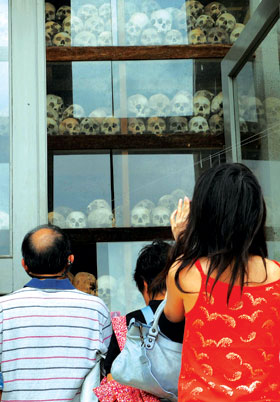 April 17th, 1975 saw the end of a civil war in Cambodia between the Lon Nol Republic and a communist movement, the Khmer Rouge. What began was a massive social experiment to return Cambodia to an idyllic agrarian society.
April 17th, 1975 saw the end of a civil war in Cambodia between the Lon Nol Republic and a communist movement, the Khmer Rouge. What began was a massive social experiment to return Cambodia to an idyllic agrarian society.
Resetting the clock to ‘year zero’, the regime led by Pol Pot set out to correct years of corruption by Western vices, first during the French colonial period and then with the increasing US presence during the Indochina wars. Hostile towards free market capitalism, the educated, those associated with the Lon Nol regime, and the wealthy, hundreds of thousands of Cambodians were killed for their former affiliations and lifestyles. More were slaughtered for no rational reason. About one-third of the population died from 1975 to 1978.
What strikes me at this time, 35 years later, is how those years of violence and death are remembered. Januaryy 7th, 1979 marks the day the Khmer Rouge regime ended due to the invasion of a Vietnamese army. In Cambodia this date has become a public holiday, “Victory Over Genocide day,” as it is called. However, I did not notice a strong government message regarding the anniversary of the genocide’s commencement. Given April 17th coincided with Khmer New Year, I’m sure citizens were much happier spending time with their families and ringing in another year. Yet, I find it surprising that the only public commemoration of Khmer Rouge victims by a political figure came from the Sam Rainsy Party, an opposition group to the ruling Cambodian People’s Party. The event was used to remind Cambodians of what has happened in their history and also to criticize the government. Many senior government officials were former Khmer Rouge cadres, including Prime Minister Hun Sen.
Other public events in Phnom Penh focused on the journalists who covered the civil war that raged from 1970-1975. 33 foreign and 5 Cambodian journalists lost their lives reporting a war sidelined by the global community due to the larger theatre of violence occurring in Vietnam.
In the United States, the Cambodian community in Long Beach, CA remembered its lost ones through a day of prayer and reflection. The UC Berkeley Cambodian Student Association organized a week-long series of events, from a candlelight vigil to a cultural show, all in an act of remembrance and resilience.
Last fall, I wrote on the initial release of a new high school textbook teaching the history of the Khmer Rouge period for the very first time. The book has taken since 1996 to make its way into print. Produced by the Documentation Center of Cambodia, one million copies are set to be distributed by the end of the year with teachers to be trained on teaching its contents as well.
With the brutal horrors of the Khmer Rouge now 35 years behind and through all the fragmented ways of remembering and honoring the dead, hopefully now upcoming generations of Cambodians will be able to learn the full history of their country.








